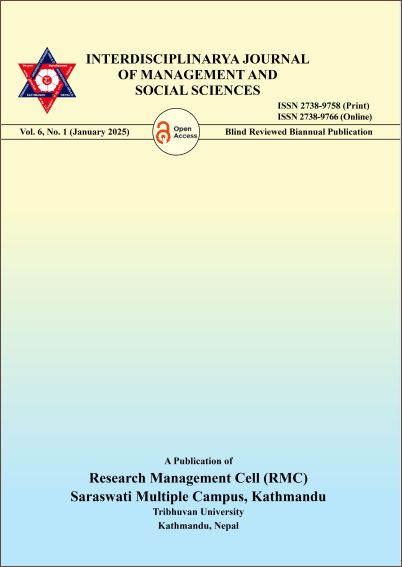Nietzsche’s Influence on Character Design in Women in Love: A Philosophical Exploration
DOI:
https://doi.org/10.3126/ijmss.v6i1.75408Keywords:
Life force, Nietzschean philosophy, Overman, self-assertion, transformation, will to powerAbstract
This paper attempts to examine philosophical infusion in D. H. Lawrence’s novel Women in Love. It examines how Lawrence has been influenced by Neitzsche's philosophy in his character portrayal in his novel. It also looks at how Lawrence shapes his characters in his novel borrowing the ideas from Nietzsche. Nietzsche's key philosophical ideas are used to the creation of characters in Women in Love. This study presents a fresh analysis of the text and opens the door for further research by analyzing the novel through the spectacles of Nietzsche's philosophy. It fosters a greater knowledge of both the literary works and Nietzsche's philosophical ideas by encouraging researchers to go deeper into classic literature and study English novels from a Nietzschean perspective. It promotes a deeper understanding of both the literary works and Nietzsche's philosophical concepts. This paper explores how Lawrence skillfully incorporates Nietzsche's philosophy into his character portrayal by opening up new avenues for philosophically informed literary analysis of classic literature. It also contributes to the understanding of classic literature and the application of philosophical concepts to literary works. Readers might understand the themes and characters of Lawrence's novels in a new way by applying Nietzschean concepts to the book. This paper sheds light on the intellectual framework of the story and divulges further levels of meaning. It expands the field of literary studies by making it easier to conduct comparative studies between different authors and philosophies. This approach promotes interdisciplinary study and more cohesive academic discourse by bridging the gaps between literature and philosophy. Furthermore, it encourages interdisciplinary research, bridging the gap between literature and philosophy, and fostering a more comprehensive academic discourse. Overall, it aims to foster a better, more comprehensive understanding of the interplay between literature and philosophy.
Downloads
Downloads
Published
How to Cite
Issue
Section
License

This work is licensed under a Creative Commons Attribution-NonCommercial 4.0 International License.

